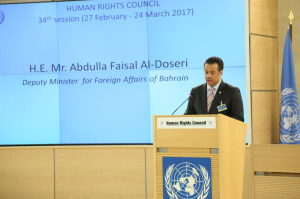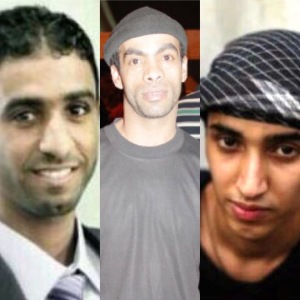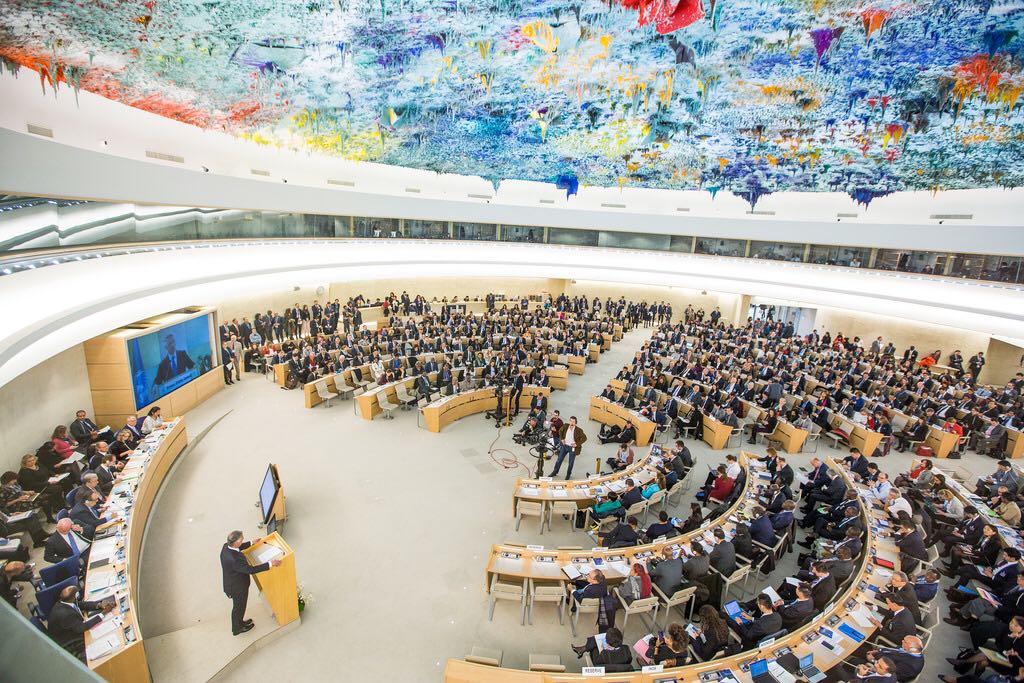
We, the undersigned, in reaction to the statement made today by Bahrain’s Deputy Foreign Minister, Mr. Abdulla Faisal al-Doseri, during the High Level Segment of the Human Rights Council (HRC), are concerned by Bahrain’s continued lack of commitment to the promotion and protection of human rights. Mr. al-Doseri used the opportunity to underscore Bahrain’s legal framework, to highlight national human rights mechanisms and claim cooperation with international bodies and domestic civil society. We would like to call attention not only to the inaccuracy of these claims, but also to the use of empty rhetoric to distract from Bahrain’s widespread and systematic practices of human rights abuse. Furthermore, we are gravely concerned by Mr. al-Doseri’s attempt to frame the ongoing human rights violations in the country – including systematic arbitrary detention and torture; draconian restrictions on free expression, assembly, and association; religious discrimination; and political exclusion – as successful reforms, thus underscores Bahrain’s commitment to further fueling the deepening human rights crisis.
New Laws Threaten Rights
Mr. al-Doseri’s praise of Bahrain’s constitution and expansive legislation to protect human rights, drastically contradict their vague provisions and flawed application in courts. The government has continued to use broadly-defined counterterror legislation to target activists, human rights defenders, and other members of civil society. In January 2017, under the guise of counterterror measures, the authorities further facilitated such abuse by re-empowering the National Security Agency (NSA), to arrest and detain civilians under the anti-terror law, which criminalizes expression of dissent or participating in protests. The Bahrain Independent Commission of Inquiry (BICI) initially recommended that the authorities strip the NSA of its arrest powers due the agency’s direct involvement in the arbitrary detention, enforced disappearance, and torture of civilians in 2011. The reversal of this recommendation – one of only two BICI recommendations that had been fully implemented – is a sign that the the Bahraini government is actively abandoning what few reforms it had previously instituted.
In February, King Hamad of Bahrain began the process of amending Bahrain’s Constitution which would allow military courts to try civilians. The National Assembly has approved the amendment, which will now be referred to the Shura council. The current Constitution prohibits military courts from trying cases of civilians unless the king has declared a state of emergency, thus activating the country’s martial law. The proposed amendment will remove all legal limitations on the martial courts. During the 2011 state of national safety, National Safety Courts oversaw hundreds of unfair trials against protesters, human rights defenders, and political leaders.
Civil Society At Risk

Despite Mr. al-Dosari’s declaration of Bahrain’s commitment to work openly and collaborate with civil society, the government has continued to target civil society and has failed to adequately protect their rights to free expression, assembly, and association. Human rights defenders have repeatedly been harassed and imprisoned for their work. Nabeel Rajab, President of the Bahrain Center for Human Rights (BCHR) and one of Bahrain’s most prominent human rights defenders, faces up to 18 years in prison in two trials. He has already served over seven months in pre-trial detention, on charges relating to his free expression. Other human rights defenders, such as Abdhuladi Al-Khawaja and Dr. Abduljalil Al-Singace, have remained arbitrarily detained, despite international calls for their release. Many other human rights defenders have also faced reprisals for their work, including interrogations, travel bans and forced exile.
Political Space Closing
In today’s remarks, Mr. al-Dosari condemned the politicization of human rights by some groups for their own political gain. While the government continues to reject attempts by independent human rights groups for the promotion and protection of human rights, Bahrain has also moved to restrict all political space for dissenting views. The Bahraini government has recently escalated its harassment of political opposition societies and dissidents, including by dissolving Al Wefaq National Islamic Society, Bahrain’s main opposition group. The closing of Al-Wefaq’s headquarters and seizing of its assets, in addition to an increase in the prison term of Sheikh Ali Salman, the party’s Secretary-General, from four years to nine, on appeal – represent further restrictive measures on Bahrain’s political space. Members of secular leftist societies including Fadhel Abbas, the former Secretary-General of Al-Wahdawi, and Ebrahim Sharif, the former Secretary-General of Wa’ad have also been targeted.
Religious Discrimination
In his speech, Mr. al-Dosari highlighted Bahrain’s efforts to promote moderation and religious tolerance, all while taking steps to counter radicalization and hate speech. However, discrimination against Bahrain’s majority Shia community has increased dramatically in the past year. Shia individuals are disproportionately targeted by arbitrary arrest, denaturalization, and deportation. Since June 2016, Bahraini authorities have also targeted over 75 Shia religious leaders, nine of which have been imprisoned on charges relating to their freedom of expression or assembly. Sheikh Isa Qassim, the most senior Shia cleric in the country, was stripped of his citizenship in June 2016 and is currently being prosecuted on charges related to the traditional Shia practice of khums. Since his denaturalization, his home town of Duraz has been under police blockade due to widespread protests to his persecution by the Government. Nightly internet blackouts, collective punishment and disruptions to freedom of movement represent just some of the restrictive measures employed by Bahraini authorities in Duraz.
Further, Bahrain has maintained deeply sectarian police and military forces in the kingdom. The Government has maintained its policies to naturalize foreign Sunni nationals into the security forces, who continue to use excessive force against Bahrain’s Shia population. The Bahrain Defense Force also maintains deeply sectarian rhetoric in training manuals and practices.
No End to Impunity

While Mr. al-Doseri expressed pride in Bahrain’s national human rights institutions, he neglected to explain why these institutions have increasingly served to obfuscate allegations of abuse. We have consistently found that Bahrain’s accountability mechanisms – the Ministry of Interior Ombudsman, the Special Investigation Unit (SIU), the Prisoners’ and Detainees’ Rights Commission (PDRC), and the National Institute for Human Rights (NIHR) – operate without the requisite independence from the government and continually fail to bring perpetrators to justice. Most recently, these mechanisms failed to competently investigate credible allegations of severe torture in the cases of Sami Mushaima, Ali al-Singace, and Abbas al-Samea, three individuals who were executed by the Government earlier this year. The SIU dismissed their torture after investigations which did not adhere to international standards. UN High Commissioner for Human Rights condemned the executions, as did the UN Special Rapporteur on extrajudicial killings, who recently raised doubts over the MoI Ombudsman’s “independence, professionalism and thoroughness.”
Conclusions
Contrary to Mr. al-Doseri’s statement, the human rights situation in Bahrain has declined to one of its lowest points in years. We are gravely concerned by the systematic enforcement of arbitrary detentions, disappearances, torture, and denaturalizations of Human Rights Defenders, unionists and political dissidents. Despite the establishment of several accountability mechanisms, these have failed to effectively address abuses, and have put the lives of the most vulnerable victims – at significant risk. Recent decisions to re-empower the NSA and expand military courts represent further alarming regressions. These indicate that Bahrain is far from walking the path to reform.
Husain Abdulla, Executive Director, ADHRB: “Today’s High Level statement by the Bahraini government is yet another deeply disappointing failure to seize true opportunities for reflection, honesty and reform, Bahrainis today are facing the most serious and widespread human rights violations in years. At the Human Rights Council, the government has an opportunity to address these abuses head on, to frankly address the need for reform, and to seek the support of the international community in the promotion and protection of universal human rights. Unfortunately, the government has failed yet again to seize this opportunity.”
Sayed Ahmed Alwadaei, Director of Advocacy, BIRD: “Actions speak louder than words, and Bahrain’s actions have included executions and new repressive laws, a blanket ban on all speech and reprisals against human rights defender. This is the true face of Bahrain, and the international community must use their opportunity at the Human Rights Council to condemn Bahrain’s doubled-down repression.”
We call on the Government of Bahrain to immediately make substantive and transparent reforms, including by implementing the 26 recommendations of the BICI, the recommendations of its Second Cycle Universal Periodic Review, and by engaging in full and open cooperation with the UN Office of the High Commissioner for Human Rights and the UN Special Procedures.
Americans for Democracy & Human Rights in Bahrain
Bahrain Center for Human Rights
Bahrain Institute for Rights and Democracy
European Center for Democracy and Human Rights




